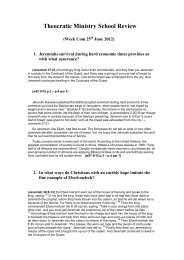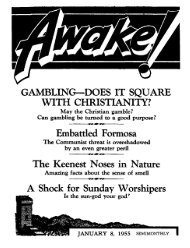1964 Awake! - Theocratic Collector.com
1964 Awake! - Theocratic Collector.com
1964 Awake! - Theocratic Collector.com
You also want an ePaper? Increase the reach of your titles
YUMPU automatically turns print PDFs into web optimized ePapers that Google loves.
A<br />
By "<strong>Awake</strong>!" correspondent in Korea<br />
COLD storm swept south across the<br />
Yalu River pouring sheets of rain<br />
onto the village of EuiJ u in North Pyung<br />
An Province, Korea. The rice paddies, filled<br />
to overflowing, spilled over the fields into<br />
the roads, tmning them into a sea of yellow<br />
mud. An angry merchant, unable to<br />
conduct his business, fled to the refuge of<br />
a tavern, where he was living during his<br />
stay in the village. He muttered his disgust<br />
for the foul weather. Business was<br />
bad; now the unpleasant prospect of a dull,<br />
boring day alone in his room. After shedding<br />
his wet outer garments, he lay on the<br />
hard clay floor contemplating his tiny cell<br />
and its walls pasted over with insulating<br />
wastepaper.<br />
The wastepaper was the standard size for<br />
official documents and, on first glance, was<br />
no different from the flood of documents<br />
that were pasted on the walls of buildings<br />
all over Korea. However, upon a closer examination<br />
of the Chinese characters, the<br />
words on these pieces of wastepaper were<br />
different and infinitely more interesting.<br />
Words like, "Happy are you poor, because<br />
yours is the kingdom of God. Happy are<br />
you who hunger now, because you will be<br />
filled."<br />
According to legend, this is how God's<br />
Word, the Bible, was read in Korea for the<br />
first time---pages of the Gospel of Luke<br />
pasted to a tavern wall. Pure legend though<br />
it is, it is nevertheless based on some fact.<br />
APRIL 8, <strong>1964</strong><br />
In the latter part of the nineteenth century,<br />
a missionary named John Ross became<br />
interested in Korea. While his work<br />
was primarily confined to China, he decided<br />
to attempt a translation of the Bible<br />
into Korean. He posted a servant at the<br />
Korean Gate in Manchuria to find him a<br />
Korean that could help him translate. In<br />
due course such a man was found, but he<br />
had to work in secrecy, even from his<br />
family; the penalty for assisting a foreigner<br />
in such work was death. Luke was chosen<br />
as the first book, and work was started<br />
in 1874. When Luke was finished, it was<br />
distributed among Korean refugees in the<br />
Yalu Valley. However, this first portion of<br />
the Korean Bible met its first great barrier;<br />
it was forbidden entry into the<br />
country.<br />
Korea proudly traces its history back<br />
centmies before the Christian era. According<br />
to legend, Korea's founder, Tangun,<br />
gave his country the traditional name Chosen,<br />
which means "Morning Calm." Known<br />
as the Hermit Kingdom, it resisted all foreign<br />
influence with a passion and forbade<br />
any contact with the outer world except<br />
China until 1876, then added only Japan.<br />
It pointed proudly to its own culture, a culture<br />
that produced movable type before<br />
Gutenberg; telescopes and observatories<br />
dating back to ancient times, and ironclad<br />
vessels long before the Monitor and Merrimac<br />
of American Civil War fame. In 1871<br />
the United States proposed a treaty with<br />
17




